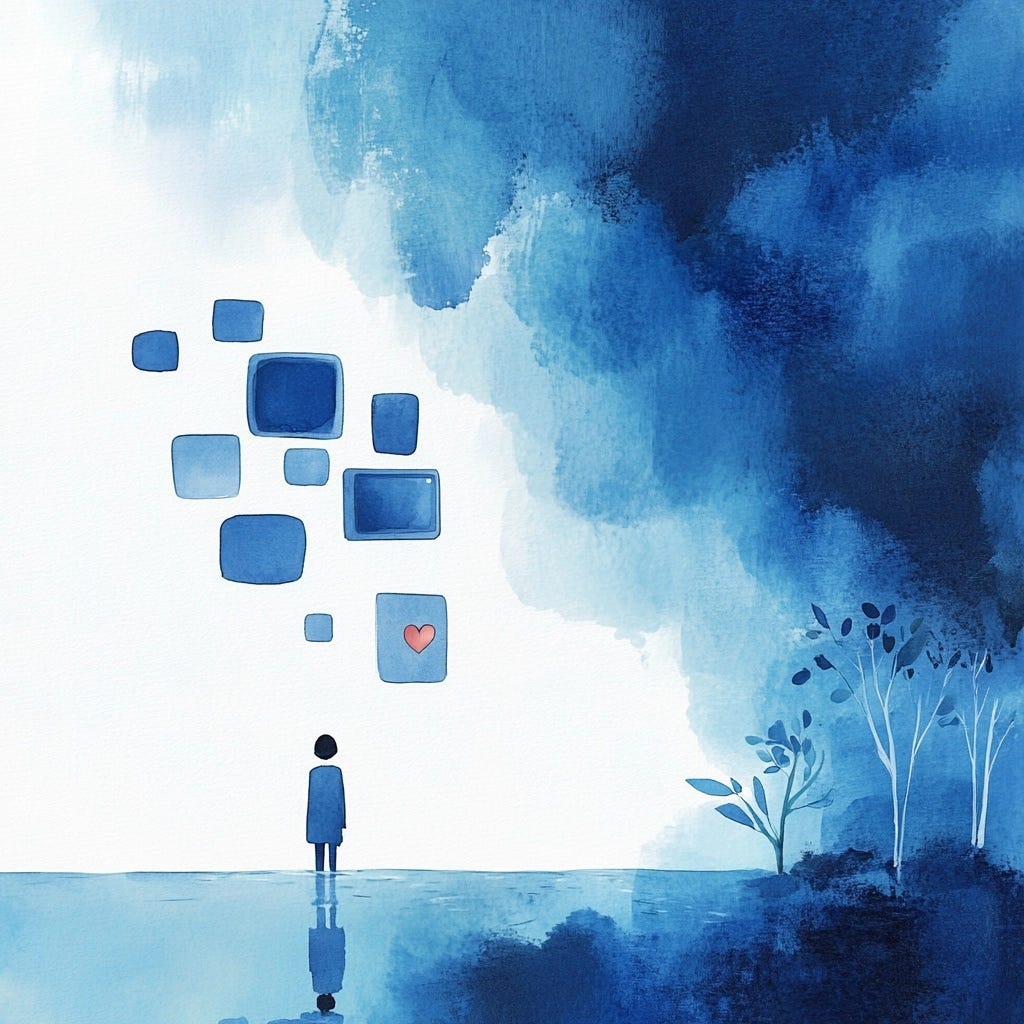Can we escape the tyranny of dopamine?
Thoughts on the search for meaning and reclaiming our attention.
The Hamster in the Cage
We no longer live in the attention economy; we live in the addiction economy. The dopamine economy. The economy of instant gratification. Every day, it's a frantic race to capture what has become our most precious resource: our brain's time. We're bombarded with notifications, alerts, and endless content. Everything is designed to hook us, to pull us back again and again, for another hit of pleasure.
This is the great carousel of the 21st century. Scroll. Click. Like. Replay. A brief rush of euphoria, quickly replaced by another craving. A cycle of consumption that never truly satisfies. By the end of the day, all that's left is emptiness.
This model is weakening. Sooner or later, it will break.
The Glorification of the Prompt
This addiction goes beyond just consuming content—it now extends to how we’re sold the simplification of complex tasks. Like many, I experiment with AI. These tools, fascinating at first, can summarize, create, and predict. Today, we’ve begun to glorify the art of crafting the perfect "prompt," as if true knowledge lies solely in finding the right command. But is that really what mastery is about? Of course not. The prompt is merely the starting point. The real value comes afterward: the intellectual journey, the gradual refinement of ideas, and the transformative power of revision. True growth happens in this space of reflection, in the pursuit itself—just like a student learns more from seeking the answer than from simply receiving it.
But what are we doing with the time these technologies free up? If AI takes care of the repetitive tasks, what about the essentials? We are drowning in an endless stream of information, and paradoxically, it's no longer the abundance that's the issue—it's discernment. Can we still recognize what truly matters in the midst of this overwhelming flood?
AI Calculates, Humans Intuit
Recently, I was chatting with a friend, an executive assistant, about an AI scheduling tool with a highly efficient predictive module. I was impressed by how well it optimized calendars and adapted to my predictable habits. She smiled, then showed me her boss’s calendar, completely booked through December. That’s when she said something that really struck me:
“Sure, AI can understand that one meeting is more important than another, or that Pilates happens every Thursday at noon. But it’ll never catch the small nuances. It won’t know you can fit in a ten-minute slot because my boss doesn’t like this person and will probably cut the meeting short. I know that.”
And that’s the key difference: AI calculates, humans intuit. Where machines rely on algorithms, we notice the subtleties—the unspoken cues, gut feelings, and instinctive decisions that slip through the cracks of code. It's in these finer details that our true uniqueness lies.
A Turning Point?
But this difference goes beyond simple discernment. What truly sets us apart is our ability to appreciate and create meaning where AI sees only raw data. Human appreciation has two dimensions: first, evaluation—our capacity to judge the quality or importance of something; and second, and more importantly, emotional resonance—the unique connection we have to the unquantifiable and the unexpected. Only our emotional intelligence can navigate these realms where algorithms fall short.
This search for depth in human experience is starting to emerge in unexpected places. For example, LEGO, with the help of dream psychologist Ian Wallace, is exploring the concept of "dream crafting." This approach allows children to consciously shape their dreams, helping them better understand their emotions while developing their imagination and resilience. It goes beyond simple entertainment, encouraging inner exploration far removed from superficial distractions, fostering a deeper connection with their emotional world.
Similarly, Black Tomato, through its Bring it Back service, offers travel experiences that transcend traditional tourism. These journeys are built around a personal or existential question that the traveler seeks to explore. Every destination and activity is carefully selected to help answer that question—whether it’s boosting creativity with a stay in Morocco or gaining deeper insights into family relationships through an immersion in Mongolia. These trips blend external discovery with internal reflection, turning travel into a path of self-discovery.
The Appreciation Economy
We may be at a turning point—a moment where true wealth is no longer measured by how much attention we can capture or how much dopamine we can generate by the minute, but by our ability to appreciate, understand, and create meaning. Technological progress should free us from superficiality and guide us toward greater depth. But we must first become conscious of this shift. We are not condemned to endlessly chase fleeting pleasures.
We need to relearn how to appreciate, how to filter out what truly deserves our attention. Marie Kondo has shown us this path with her KonMari method, urging us to keep only what "sparks joy." We must do the same with our time, our energy, and our minds.
For years, we’ve been caught in the pursuit of quick thrills, drowning in the ephemeral. But now, the moment has come to return to what truly matters—to rediscover how to feel, to think deeply, and to create meaning.
The question is no longer what we can produce. The question is: what will we choose to preserve?
MD





from the disposable culture to the care culture. point #9 of "LE NEW CONSUMER" manifesto: “If you died tomorrow, what room full of stuff with your name on it would you like to leave behind?”
https://open.substack.com/pub/objet/p/080-le-new-consumer-manifesto?utm_campaign=post&utm_medium=web
"The question is no longer what we can produce. The question is: what will we choose to preserve?" So powerful and so right. I've heard from many people working in consulting who believe that the arts are going to make a big comeback and I, for one, am here for it.